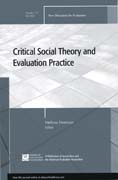
INDICE: EDITOR'S NOTES (Melissa Freeman). 1. Critical Social Theory: Core Tenets, Inherent Issues (Melissa Freeman, Erika França S. Vasconcelos) This chapter outlines the core tenets of critical social theory and describes inherentissues facing evaluators conducting critical theory evaluation. 2. Falling Forward: Lessons Learned From Critical Reflection on an Evaluation Process With a Prisoner Reentry Program (Barbara Hooper) A formative evaluation of life-skills learning modules with men and women in a residential prisoner reentry program is critically reflected on for consistency and inconsistency to the tenetsof critical theory on issues of voice, inclusion, and power. 3. Critical Development? Using a Critical Theory Lens to Examine the Current Role of Evaluation in the Youth-Development Field (Sarah Zeller-Berkman) A critical theory lensis used to examine the way a theory of change for the field of youth development and youth program evaluations inadvertently maintain young people in the United States in a low-status position. 4. Moral Knowledge and Responsibilitiesin Evaluation Implementation: When Critical Theory and Responsive Evaluation Collide (Melissa Freeman, Judith Preissle, Steven Havick) A retrospective analysis of an external evaluation of an inaugural summer camp to teach high school students how to preserve religious freedom reveals the challenges of balancing obligations to promote the social well-being of society with responsibilities to clients and other stakeholders. 5. Examining Outcomes-Based Educational Evaluation Through a Critical Theory Lens (Christina Segerholm) Contemporary educational evaluation policy and practice is challenged by applying critical theory and hermeneutics perspectives and by asking whose interests are being served through evaluation. 6. Against the Majoritarian Story of School Reform: The Comer Schools Evaluation as a Critical Race Counternarrative (George W. Noblit, Michelle Jay) This chapter documents how a critical race theory perspective illuminates the way evaluators constructed a counternarrative of school reform while working with James Comer's School Development Program. 7. Critical Social Theory Evaluation: Slaying the Dragon (Linda Mabry) This chapter examines the historical and professional controversies, risks, compensations, and opportunity costs associated with taking, or not taking, a critical social theoryapproach to evaluation. INDEX.
- ISBN: 978-0-470-90944-7
- Editorial: John Wiley & Sons
- Encuadernacion: Rústica
- Páginas: 112
- Fecha Publicación: 16/11/2010
- Nº Volúmenes: 1
- Idioma: Inglés
